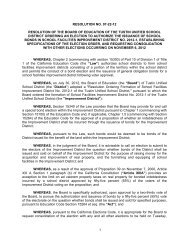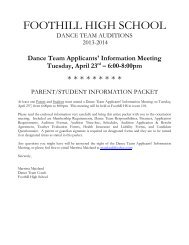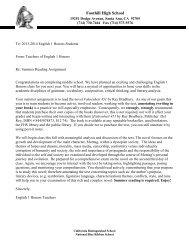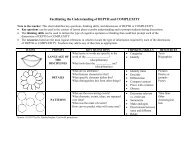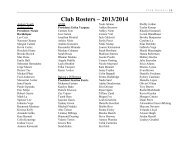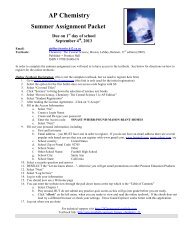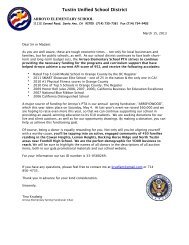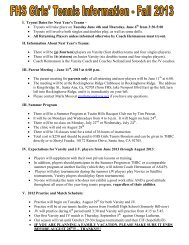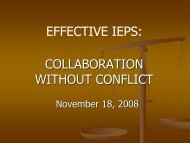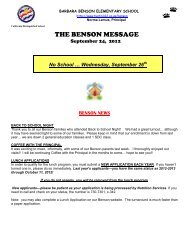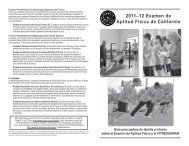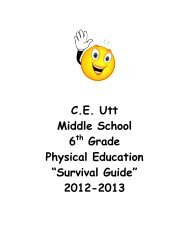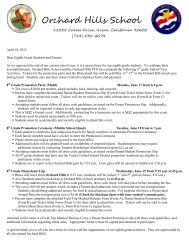College Planning - Tustin Unified School District
College Planning - Tustin Unified School District
College Planning - Tustin Unified School District
Create successful ePaper yourself
Turn your PDF publications into a flip-book with our unique Google optimized e-Paper software.
navigating financial aid<br />
Scholarship scams<br />
Securing money to pay for a college education<br />
can cause a great deal of stress in a family.<br />
Some unscrupulous companies prey upon the<br />
stress the financial aid search can cause. The<br />
Federal Trade Commission (FTC) warns students<br />
and their parents to watch for these six warning<br />
signs of a scholarship scam.<br />
warning signs<br />
1. “The scholarship is guaranteed or your<br />
money back.”<br />
No service can guarantee that it will get you<br />
a grant or scholarship. Refund guarantees<br />
often have impossible conditions attached.<br />
Review a service’s refund policies in writing<br />
before you pay a fee. Typically, fraudulent<br />
scholarship search services require that<br />
applicants show rejection letters from each<br />
of the sponsors on the lists they provide<br />
to request a refund of any fees paid. If a<br />
sponsor no longer exists, if it really does<br />
not provide scholarships, or if it has a<br />
rolling application deadline, letters of<br />
rejection are almost impossible to obtain.<br />
2. “The scholarship service will do all<br />
the work.”<br />
Unfortunately, nobody else can fill out<br />
the personal information forms, write the<br />
essays, and supply the references that<br />
many scholarships require.<br />
3. “The scholarship will cost some money.”<br />
Be wary of any charges related to<br />
scholarship information services or<br />
individual scholarship applications,<br />
especially in significant amounts. Some<br />
legitimate scholarship sponsors charge<br />
fees to defray their processing expenses.<br />
Before you send money to apply for a<br />
scholarship, investigate the sponsor. “Free”<br />
money shouldn’t cost you a thing.<br />
4. “You can’t get this information<br />
anywhere else.”<br />
Scholarship directories are available in<br />
any large bookstore, public library, or<br />
high school counseling office. Additional<br />
information on private scholarship<br />
programs, including scams, can be found at<br />
www.finaid.org.<br />
5. “You are a ‘finalist’ in a contest you never<br />
entered, or you have been selected<br />
by a ‘national foundation’ to receive a<br />
scholarship.”<br />
Most legitimate scholarship programs<br />
never seek particular applicants and<br />
will most likely only contact you in<br />
response to an inquiry. If you think there<br />
is a real possibility that you might have<br />
been selected to receive a scholarship,<br />
investigate before you send money to be<br />
sure the sponsor or program is legitimate.<br />
6. “The scholarship service needs your<br />
credit card or checking account number<br />
in advance.”<br />
Never provide your credit card or checking<br />
account number on the telephone to the<br />
representative of an organization that you<br />
do not know. A legitimate need-based<br />
scholarship will not ask for your checking<br />
account number. Get information in writing<br />
first. An unscrupulous operation does not<br />
need your signature on a check. It schemes<br />
to set up situations that allow it to drain<br />
a victim’s account with unauthorized<br />
withdrawals.<br />
Other points to consider in a<br />
scholarship program:<br />
Fraudulent scholarship operations often<br />
use official-sounding names containing<br />
words, such as federal, national,<br />
administration, division, federation,<br />
and foundation. Their names are often a<br />
slight variant of the name of a legitimate<br />
government or private organization. Do not<br />
be fooled by a name that seems reputable<br />
or official, an official-looking seal, or a<br />
Washington, D.C. address.<br />
If you win a scholarship, you will receive<br />
written official notification by mail, not<br />
by telephone. If the sponsor calls to inform<br />
you, they will follow up with a letter in the<br />
mail. If a request for money is made by<br />
phone, the operation is probably fraudulent.<br />
Beware of telephone numbers with a 900<br />
area code. These will charge you a fee of<br />
several dollars a minute for a call that could<br />
be a long recording and provides only a list<br />
of addresses or names.<br />
A dishonest operation might put pressure<br />
on an applicant by saying that awards are<br />
on a first-come, first-served basis. Some<br />
scholarship programs give preference to the<br />
earliest qualified applications. However, if<br />
you are told (especially on the telephone)<br />
that you must respond quickly but you<br />
will not hear about the results for several<br />
months, there might be a problem.<br />
Be wary of endorsements. Fraudulent<br />
operations claim endorsements by groups<br />
with names similar to well-known private<br />
or government organizations. The Better<br />
Business Bureau and government agencies<br />
do not endorse businesses.<br />
21




